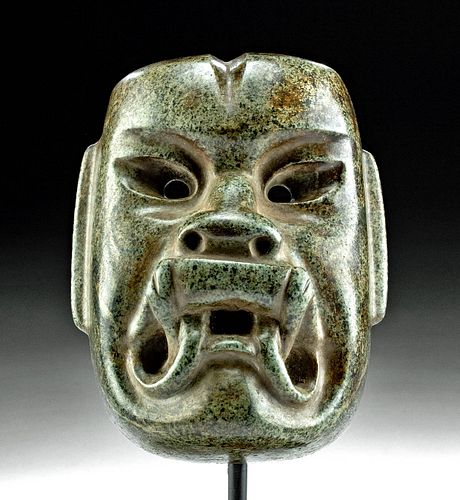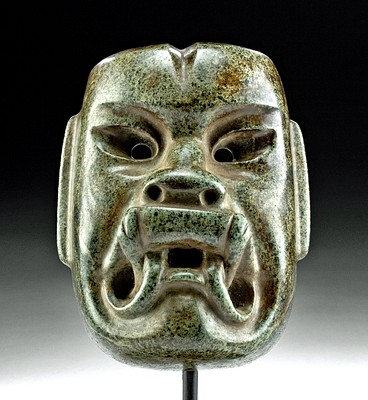Stunning Olmec Jade Maskette Were-Jaguar Transforming
Lot 190
About Seller
Artemis Fine Arts
686 S Taylor Ave, Ste 106
Louisville, CO 80027
United States
Selling antiquities, ancient and ethnographic art online since 1993, Artemis Gallery specializes in Classical Antiquities (Egyptian, Greek, Roman, Near Eastern), Asian, Pre-Columbian, African / Tribal / Oceanographic art. Our extensive inventory includes pottery, stone, metal, wood, glass and textil...Read more
Estimate:
$180,000 - $270,000
Absentee vs Live bid
Two ways to bid:
- Leave a max absentee bid and the platform will bid on your behalf up to your maximum bid during the live auction.
- Bid live during the auction and your bids will be submitted real-time to the auctioneer.
Bid Increments
| Price | Bid Increment |
|---|---|
| $0 | $25 |
| $300 | $50 |
| $1,000 | $100 |
| $2,000 | $250 |
| $5,000 | $500 |
| $10,000 | $1,000 |
| $20,000 | $2,500 |
| $50,000 | $5,000 |
| $100,000 | $10,000 |
| $200,000 | $20,000 |
About Auction
By Artemis Fine Arts
Oct 7, 2021
Set Reminder
2021-10-07 10:00:00
2021-10-07 10:00:00
America/New_York
Bidsquare
Bidsquare : Exceptional Antiquities Ethnographic Fine Art
https://www.bidsquare.com/auctions/artemis-gallery/exceptional-antiquities-ethnographic-fine-art-7537
Museum-worthy examples of Egyptian, Greek, Roman, Etruscan, Near Eastern, Far East / Asian, Pre-Columbian, African / Tribal, Oceanic, Native American, Spanish Colonial, Fossils, Ancient Jewelry, Fine / Visual Arts, so much more! Artemis Fine Arts info@artemisfinearts.com
Museum-worthy examples of Egyptian, Greek, Roman, Etruscan, Near Eastern, Far East / Asian, Pre-Columbian, African / Tribal, Oceanic, Native American, Spanish Colonial, Fossils, Ancient Jewelry, Fine / Visual Arts, so much more! Artemis Fine Arts info@artemisfinearts.com
- Lot Description
Pre-Columbian, Mexico to Guatemala, Olmec, ca. 900 to 600 BCE. In a word, wow! Finely carved and string-cut from dark green omphacite jade, an incredibly expressive depiction of a were-jaguar transformation mask with a square jaw, feline eyes, flat nose with broad nostrils, trapezoidal mouth with flared upper lip and drooping corners, making for a feline mouth. The usual headband is not present, perhaps to allow room on the stone's surface for that incredibly dramatic expression, which even surpasses the most theatrical Olmec visages we have encountered. The eyes are almost bean-shaped with drilled pupils and up-turned outer canthi beneath a narrowed brow, and the mouth is enveloped by prominent nasolabial folds that act as a parenthesis emphasizing the dramatically curved fangs that protrude from the flared lips of the beast. Lengthy ear flaps flank the zoomorphic visage, while an impressed striation vertically adorns the top of the head. Additional perforations at the peripheries were created presumably for attachment. A truly exceptional full maskette! Size: 4.1" W x 5.3" H (10.4 cm x 13.5 cm); 7.3" H (18.5 cm) on included custom stand.
The attention to detail on this piece is quite impressive. Note the expressive lips and cleft palette of the jaguar mouth, the full nose with pierced nostrils, the stylized elliptical-shaped eyes, and the partially drilled circular motifs at the corners of the mouth. To the Olmecs, masks and maskettes like this example carried many meanings, not all of which are obvious to us today; however, scholars surmise that the color green was associated with vibrant growth, renewal, and given the cyclical conception of life and death, rejuvenation after death. Additionally, jaguar imagery symbolized power and might throughout the Pre-Columbian world; hence, warriors, rulers, hunters, and shamans alike associated themselves with this king of beasts, the largest and most powerful feline in the New World.
Research in the late 1990s and early 2000s pinpointed the source of what is colloquially referred to as "Olmec blue" jade in the lowland Motagua River near the modern-day border of Guatemala and Honduras; stone from this source was carved and traded widely throughout early Mesoamerica. The value of jade for ancient people lay in its symbolic power: perhaps its color was associated with water and vegetation; later, the Maya would place jade beads in the mouths of the dead. Many scholars have argued that the demand for jade contributed to the rise of long-distance trading networks and to the rise of urban centers in ancient Mesoamerica. This jade celt would have been regarded as an exceedingly valuable and rare piece of ceremonial art.
A similar example can be found in Dumbarton Oaks in Washington DC under accession number PC.B.020. Additionally, another example depicting a slightly earlier period in the transformational process can be found at The Metropolitan Museum of Art under accession number 1977.187.33
A somewhat larger Olmec jade mask was sold by Sotheby's New York for $481,000 during their "African, Oceanic And Pre-Columbian Art" auction on May 16th, 2008 (sale number N08444, lot 14).
Accompanied by a hardbound CIRAM Scientific Analysts report attesting to its authenticity and Ruffner Art Advisory Fair Market Value report.
This piece has been searched against the Art Loss Register database and has been cleared. The Art Loss Register maintains the world's largest database of stolen art, collectibles, and antiques.
Provenance: private Orange City, Florida, USA collection; ex-L. Smyth collection, Orange City, Florida, USA, acquired in the 1970s to 1980s from father; ex-William C. Peverly private collection, Syracuse, New York, USA, obtained between the 1970s and 1980s
All items legal to buy/sell under U.S. Statute covering cultural patrimony Code 2600, CHAPTER 14, and are guaranteed to be as described or your money back.
A Certificate of Authenticity will accompany all winning bids.
PLEASE NOTE: Due to recent increases of shipments being seized by Australian & German customs (even for items with pre-UNESCO provenance), we will no longer ship most antiquities and ancient Chinese art to Australia & Germany. For categories of items that are acceptable to ship to Australia or Germany, please contact us directly or work with your local customs brokerage firm.
Display stands not described as included/custom in the item description are for photography purposes only and will not be included with the item upon shipping.
#167677Very light abrasions to some surfaces, otherwise intact and choice. Impressive preservation of detail. Stunningly smooth surfaces, and fantastic stone coloration visible.Condition
- Shipping Info
-
All shipping is handled in-house for your convenience. Your invoice from Artemis Gallery will include shipping calculation instructions. If in doubt, please inquire BEFORE bidding for estimated shipping costs for individual items.
-
- Buyer's Premium



 EUR
EUR CAD
CAD AUD
AUD GBP
GBP MXN
MXN HKD
HKD CNY
CNY MYR
MYR SEK
SEK SGD
SGD CHF
CHF THB
THB














